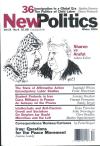Winter 2004 (New Politics, Vol. IX, No. 4, Whole Number 36)

Affirmative Action — 2003, Reginald Wilson
Sharon vs. Arafat: Leader Bashing as Means in the Oppression of a Nation, Adam Keller
The U.S. Occupation of Iraq: Questions for the Peace Movement, Joanne Landy
Immigration in a Global Era, Saskia Sassen
Child Labor in the . . .
Read more ›
review
Among the great British Marxist historians Eric Hobsbawm is the only one to remain in the Communist Party until the late 1980s. His decision to do so has never fully been explained. Thus the publication of his autobiography, Interesting Times, is an exciting event, as it has the potential of addressing this question. How did Hobsbawm manage to reconcile himself, for example, to 1956? Did he not at least feel disillusioned when he learned about Stalinist atrocities?
I was sitting in the homeless unit of the Grove Hall Department of Transitional Assistance (welfare department) chatting with some women. One was living in a homeless shelter in Saugus, a town on the north shore of Massachusetts; the other was applying for shelter. They were ashamed to be here. They said that they had worked and held responsible jobs. Life had dealt them raw blows. One had to leave her job because of an injury to her spine that seemed to require endless treatment, and she did not know when she could return to work.
Stephen Jay Gould, the palaeontologist and science writer who died last year, wrote — brilliantly — on a bewildering series of subjects, but he is perhaps best known for his contribution to four: general evolutionary theory; the sociobiology debate; the relationship between science and religion; and the study (or critique of it) of intelligence testing.
We are witnessing today a paradoxical and unsettling phenomenon: the rise of fascist-inspired political movements in the European arena (from France to Italy, from Belgium to Austria), accompanied, in the heart of intellectual circles, by a massive campaign to denigrate the entire anti-fascist tradition.
In France we have just experienced a great wave of strikes that directly addressed matters of political power. French history is defined by explosions of militancy which, for our governing class and for most of our journalists, are a "French sickness" that would be good to get rid of: before 2003 there was 1995; before 1995, 1968; before 1968, 1953 and so forth, all the way back to the Revolution. But this time there is something new: the latest wave of militant action is not an end to itself and is only an introduction.
A world away from us, in the straits of Malacca, between Indonesian Sumatra and Malaysia, approximately 2,000 fishing platforms, known as jermals, operate miles from shore. Fewer than 400 are officially registered with the Indonesian government; the rest operate illegally. These small fishing platforms are built from giant logs that are sharpened like stakes and dropped from barges into the sea floor in water up to twenty meters deep. They form an open-ended rectangular stockade to which smaller timbers are lashed horizontally.
This article is part of an ongoing discussion of the Iraq war and its aftermath. Various New Politics editors will be writing on this subject in future issues, not always with identical viewpoints, and we welcome contributions from our readers.

